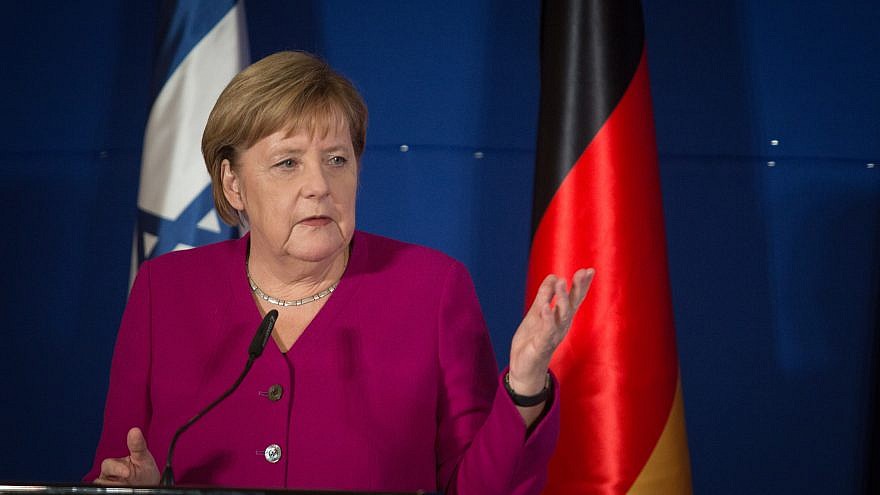For German Chancellor Angela Merkel’s opponents, defectors and even supporters, the announcement that she will not seek the chancellery in 2021 is not yet cause for either celebration or concern. Her exit as Chancellor is predicted to be just like her 13-year-long reign: dragged out.
Leading the “Merkel Must Go” opposition on the Jewish side are political newcomers, Jewish members of the right-wing Alternative for Deutschland (AfD), who early this month inaugurated the “Jews in the AfD” (JAfD) faction in Wiesbaden, the capital of the German state of Hesse. The event took place, inadvertently, near the site where the ravaged body of Jewish schoolgirl, Susanna Feldmann, was murdered by an illegal Iraqi asylum seeker. Feldmann’s murder shocked Germany, the Jewish community, and especially locals, and it likely pushed voters towards the only party to categorically reject Merkel’s refugee policy, which has seen a rise in terrorism in Germany.
While it’s difficult to measure what kind of impact Jews joining the AfD has had on the larger entity’s reputation, which is often smeared as “Nazi party,” it was the state of Hesse that eventually sealed Merkel’s slow downfall.
Just three weeks after the JAfD caucus, Hesse held its regional vote for state parliament. While Merkel’s party won the election with 27 percent of the votes, it suffered a decline of about 11 points since the last Hesse election. SPD similarly suffered, with a drop from around 30 to 20 percent. The two overall winners were the left-wing Greens (tied with the SPD) and the AfD (13 percent). The results reflect those of the Bavarian elections held on Oct. 14, as well as last year’s general election, after which Merkel barely eked out a coalition government with the Social Democrats (SPD).
The far-reaching conclusion could not be ignored: Merkel lost her mandate as the party’s leader. She will not seek the chairmanship at the party’s conference in December.
‘The political chaos we have today’
The news comes as relief to Israel advocate Sacha Stawski, chair of the Honestly Concerned media watchdog group and organizer of next month’s “Israel Congress” in Frankfurt.
“I was a personal fan of Angela Merkel for a long time, but I have to admit that she overstayed her position, and that has had the consequence that people have been looking for alternatives. And since there weren’t too many alternatives available, people in my opinion have chosen the wrong alternatives,” said Stawski. “For the AfD to be jumping into the Hesse parliament with 13 percent are shocking results.”
Stawski shares the disdain of the established Jewish community, particularly the Zentralrat (Council of Jews in Germany), towards the AfD, and believes that Jews are misguided in downplaying what he considers their extremist views. He hopes a new CDU leader will return the party to its conservative course.
“People need to see that there is a true conservative, political mainstream party which they can elect, in which they can expect things to be handled differently than the way Angela Merkel has been handling them,” he said. “I understand that she has taken the stand of wanting to help refugees coming into this country, but unfortunately, she did not have a plan in place on how to handle the situation. This has resulted in the political chaos we have today.”
For Andreas Boldt, a German pro-Israel activist and founder of the popular German-Israel Friendship Facebook page, Merkel’s departure cannot come fast enough. He thinks that her refugee policy has endangered German Jews and Israel for importing anti-Semitism from Muslim countries. He doesn’t foresee any new CDU leader standing down from that policy.
“I want new elections,” said Boldt. “That’s what I prefer, actually.”
Eldad Beck, author of Chancellor Merkel, Israel and the Jews, and Berlin correspondent for Israel Hayom, is unsure that Merkel’s successor would be as historically and politically engaged with Israel and the German Jewish community.
“I profoundly believe that with the departure of Merkel we’re losing one of the best or the best friends we ever had in Germany,” said Beck. “Even if there is some criticism of the way her government is financing problematic organizations and foundations, and went into open conflict with the Israeli government on the issue of settlements and Iran, I do believe that she brought the relations between both countries into a new dimension of cooperation on all levels, and we should not forget her statement according to which Israel’s existence and security are a part of Germany’s raison d’être.”
He makes no predictions and thinks “everything is possible.”
“Once Merkel is gone—and if the CDU would become conservative again—the AfD might lose many, many votes because as of today, they have presented themselves as new conservatives.”
If the CDU caters once again to its conservative base, would Fuhl vote for it?
“This depends not only on the CDU, but also on the development of the AfD,” he said, describing some proposed successors as “Merkel clones.”
“With the AfD, we have a conservative party. If the AfD can maintain its current course and does not drift too much to the right, I see no reason to leave the party or re-elect the CDU. With all the ‘problem children’ we have in the AfD, they also exist in the other parties. My fundamental political positions are best taken in the AfD at the present time. I cannot imagine that the CDU can and will develop so far back to conservatism without breaking apart.”


























